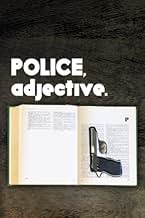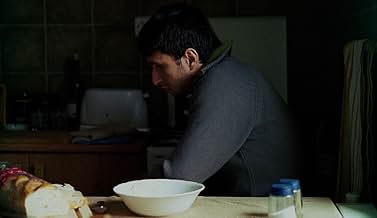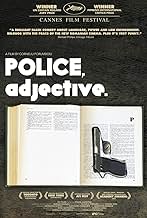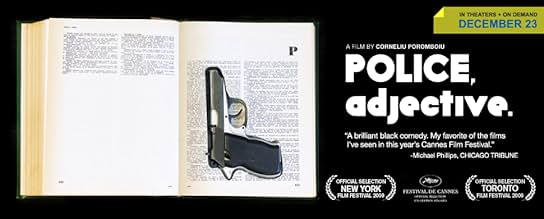CALIFICACIÓN DE IMDb
6.9/10
5.4 k
TU CALIFICACIÓN
Agrega una trama en tu idiomaA police officer refuses to arrest a young man for offering drugs to his friends.A police officer refuses to arrest a young man for offering drugs to his friends.A police officer refuses to arrest a young man for offering drugs to his friends.
- Premios
- 15 premios ganados y 15 nominaciones en total
George Remes
- Vali
- (as Remes George)
Constantin Dita
- Officer on Duty
- (as Costi Dita)
- Dirección
- Guionista
- Todo el elenco y el equipo
- Producción, taquilla y más en IMDbPro
Argumento
¿Sabías que…?
- TriviaRomania's official submission to 82nd Academy Award's Foreign Language in 2010.
- Bandas sonorasNu te parasesc iubire
Performed by Mirabela Dauer
Arranged by Dan Dimitriu
Lyrics by Dan Ioan Pantoiu
Produced by Roton Music
Played and discussed at Cristi's home
Opinión destacada
This is a film about a policeman and a matter of conscience. There's a circle of three friends, two boys and a girl, one boy has denounced the other boy to the police for supplying marijuana, it appears that this is so he can have the girl to himself. Our policeman, Cristi is being pressed to slap the cuffs on the kid by his superior, the charge is a life-wrecker, seven years in prison for smoking joints at lunch break. Cristi spends the movie trying to avoid this outcome. As he says, it's a foolish law.
Cristi is pushing against a bureaucracy that simply doesn't care, and ends up looking like a fool when he talks to people who are more educated with him, for example suffering his girlfriend's overanalysis of a ludicrous ballad, or the pseudo-dialectics of his boss, a masterpiece of sophistry. The point is that language or words often constitute another form of aggression, as the Athenians knew, you can win any argument once you have mastered rhetoric. Of course, as soon as anyone raises their voice or gets upset, this is taken as a sign that they've lost the argument, the intellectual warfare, losing having nothing whatsoever to do with being right or wrong of course.
The film is about conscience, something that totalitarian societies tried to eliminate in favour of the wisdom of the law. Good film although some of the intricacies of the discussions were lost on me not being a Romanian, and unable to follow the thread of Romanian spelling and grammar.
I actually loved the movie on an aesthetic level, I doubt it was intentional, but I always pick up on dashes of yellow in visual arts, an eccentricity of mine. For example in the street where the kid under surveillance lives, all the utilities pipes that come out onto the street are painted bright yellow, the young girl appears first wearing a bright yellow top under denim, and Cristi uses a yellow lighter and a yellow pen, most of the rest of the colour in the movie is very dull and subdued, I enjoyed these flashes. It's also nice seeing old communist offices, nowadays in the west everything is open plan and new, no-one has offices except the capo di tutti capi. Here there's peeling plaster, old caved in lockers, and a little peace and quiet. Hell I even liked just seeing Cristi sat down eating. Then there's the formal way where letters and plans are just shown on the screen with no background. I like the style of the police reports.
I would just point out that based on my understanding of the film, the English title is a mistranslation, politist is like the French word policier, which all we can translate as is "police procedural"; another translation is "policeman". The translations are nouns though so I was a little confused as to why it's being referred to as an adjective. Maybe the error is meaningful?
Cristi is pushing against a bureaucracy that simply doesn't care, and ends up looking like a fool when he talks to people who are more educated with him, for example suffering his girlfriend's overanalysis of a ludicrous ballad, or the pseudo-dialectics of his boss, a masterpiece of sophistry. The point is that language or words often constitute another form of aggression, as the Athenians knew, you can win any argument once you have mastered rhetoric. Of course, as soon as anyone raises their voice or gets upset, this is taken as a sign that they've lost the argument, the intellectual warfare, losing having nothing whatsoever to do with being right or wrong of course.
The film is about conscience, something that totalitarian societies tried to eliminate in favour of the wisdom of the law. Good film although some of the intricacies of the discussions were lost on me not being a Romanian, and unable to follow the thread of Romanian spelling and grammar.
I actually loved the movie on an aesthetic level, I doubt it was intentional, but I always pick up on dashes of yellow in visual arts, an eccentricity of mine. For example in the street where the kid under surveillance lives, all the utilities pipes that come out onto the street are painted bright yellow, the young girl appears first wearing a bright yellow top under denim, and Cristi uses a yellow lighter and a yellow pen, most of the rest of the colour in the movie is very dull and subdued, I enjoyed these flashes. It's also nice seeing old communist offices, nowadays in the west everything is open plan and new, no-one has offices except the capo di tutti capi. Here there's peeling plaster, old caved in lockers, and a little peace and quiet. Hell I even liked just seeing Cristi sat down eating. Then there's the formal way where letters and plans are just shown on the screen with no background. I like the style of the police reports.
I would just point out that based on my understanding of the film, the English title is a mistranslation, politist is like the French word policier, which all we can translate as is "police procedural"; another translation is "policeman". The translations are nouns though so I was a little confused as to why it's being referred to as an adjective. Maybe the error is meaningful?
Selecciones populares
Inicia sesión para calificar y agrega a la lista de videos para obtener recomendaciones personalizadas
- How long is Police, Adjective?Con tecnología de Alexa
Detalles
Taquilla
- Presupuesto
- EUR 800,000 (estimado)
- Total en EE. UU. y Canadá
- USD 53,206
- Fin de semana de estreno en EE. UU. y Canadá
- USD 19,452
- 27 dic 2009
- Total a nivel mundial
- USD 162,974
- Tiempo de ejecución1 hora 55 minutos
- Color
- Mezcla de sonido
- Relación de aspecto
- 1.85 : 1
Contribuir a esta página
Sugiere una edición o agrega el contenido que falta

Principales brechas de datos
By what name was Politist, adjectiv (2009) officially released in India in English?
Responda


























